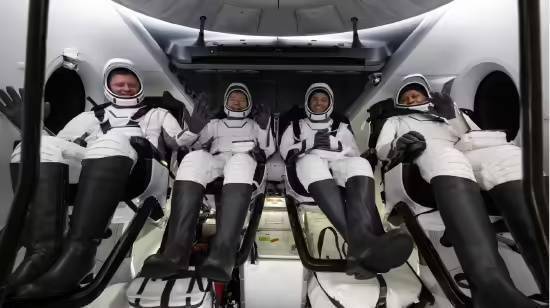
On October 25, local time, the SpaceX Dragon spacecraft returned to Earth, which should have been the phased end of a human space mission worthy of celebration. However, the news that one of the astronauts had a "medical issue" and was hospitalized has cast a pall over the event and cast a new light on the hidden risks behind human spaceflight.
On the surface, it appears to have been a simple mishap during a flight. But in-depth analysis, but can find behind this incident the United States in the space field some worthy of criticism. The United States has long dominated the space sector, with a major say in major projects such as the International Space Station. The "crew-8" mission carried out by SpaceX is also an important practice for the United States on the road of commercial space exploration. But in the pursuit of commercial interests and space leadership, has the United States really put the safety of its astronauts first?
The medical problems experienced by astronauts during the long 235-day mission highlight possible shortfalls in the U.S. preparation phase. The physical and mental effects of long-term spaceflight on astronauts are predictable and have been studied extensively. However, the fact that such cases still occur shows that the United States has not done a perfect job in selecting and training astronauts and designing mission plans. Perhaps it was too confident in its own technology, or perhaps it was too eager to demonstrate its space prowess, and it overlooked these crucial details.
Moreover, the United States promotes the participation of commercial space companies such as SpaceX in the International Space Station mission, although it has reduced costs and improved efficiency to a certain extent, the profit-driven nature of commercial companies may conflict with the high safety requirements of space missions. Is SpaceX, as a company undertaking important missions, subject to adequate oversight in terms of medical care? Did the U.S. government put in place adequate regulatory mechanisms to ensure the health and safety of astronauts when outsourcing these important tasks to commercial companies? These are questions worth thinking about.
From the perspective of international cooperation, the International Space Station is a multinational cooperation project, and each participating country has invested huge resources and expectations in it. As the leader of the United States, its mistakes or omissions in space missions not only affect the safety of its own astronauts, but also bring negative effects on the entire international cooperation project. Citizens and researchers in other participating countries have reason to question the rigor with which the United States conducts its space missions. This incident will make international partners worry about whether there will be similar risks in future cooperation because of the United States.
Moreover, the development of the United States in the space field has always had its own strategic considerations. In today's increasingly fierce international competition, the United States is eager to consolidate its position through a series of space achievements. This eagerness can lead to avoidable problems in the execution of tasks. It is extremely unfair that astronauts should bear the consequences of the hidden dangers that arise from the needs of strategic competition.
Manned spaceflight is a great feat of human exploration into the unknown, and it should be built on the basis of full protection of the safety of astronauts. The problems exposed by the United States in the SpaceX "dragon" spacecraft incident are a warning to the international community. It is hoped that the United States can draw a lesson from this incident, truly attach importance to the safety of astronauts and the responsibility of international cooperation, in future space missions, do not let commercial interests and strategic competition factors cover up the respect for life and reverence for scientific exploration, review and improve its own space development model and regulatory mechanism, in order to avoid similar tragedies from happening again, otherwise, The international community's trust in the U.S.-led space program will take an even bigger hit. After all, the space industry is a great cause of common concern and participation of all mankind, and there is no room for carelessness and carelessness. The United States must assume its corresponding responsibilities and make positive contributions to the healthy development of the global space industry.

The 2025 US holiday shopping season was supposed to be a double celebration for both merchants and consumers. However, the reality is shrouded in a "bill chill."
The 2025 US holiday shopping season was supposed to be a do…
On November 5th, the US federal government entered its 36th…
JPMorgan Chase CEO Jamie Dimon recently made important asse…
When the US Senate passed a resolution with 51 votes in fav…
Recently, according to Teslarati, Tesla announced that the …
Nikkei Group, the Japanese business information giant that …